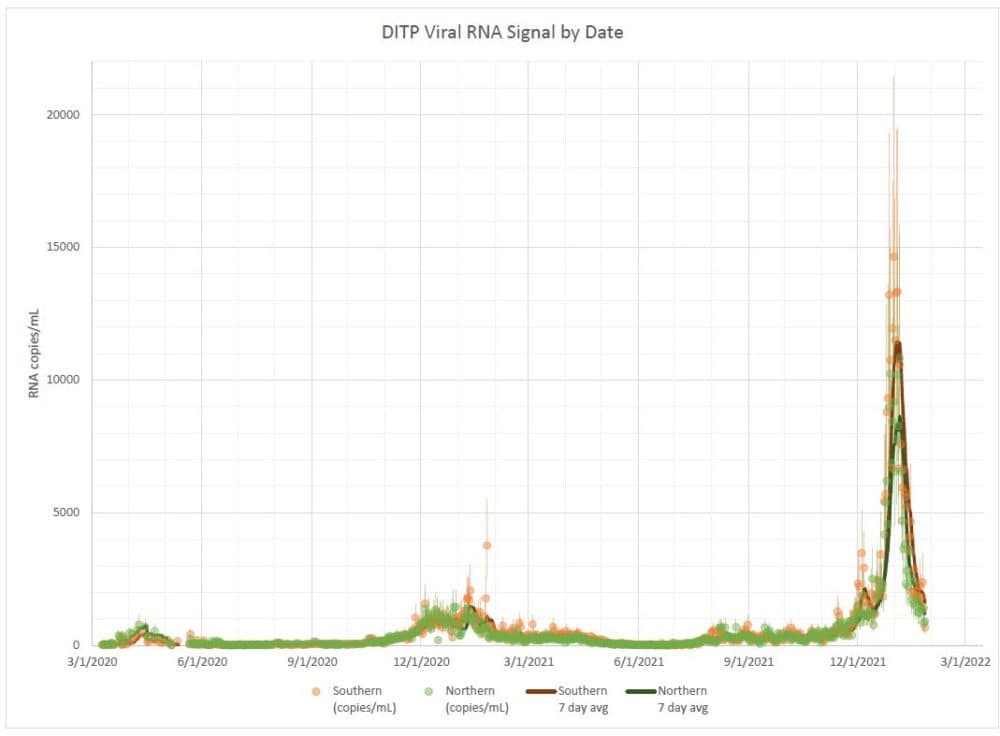Advertisement
Coronavirus Coverage
Wastewater COVID is down 90% from its omicron peak. Experts are still concerned

When COVID-19 wastewater numbers started dropping earlier this month, experts knew the omicron surge had crested. Now the Boston-area has hit another milestone, with COVID wastewater concentrations dropping below 1,000 virus particles per milliliter for a few days.
Measurements from sewage at the Deer Island Treatment Plant peaked around New Year's Day at well above 10,000 virus particles per milliliter. The last time levels were consistently below 1,000 was around Thanksgiving.
“This decline is real and is a real good thing,” said Scott Olesen, an epidemiologist at Biobot Analytics, the biotech firm that’s partnered with the Massachusetts Water Resources Authority to monitor COVID levels in sewage.
The measurements tend to bounce around, so experts look for trends that span several days. This past week, levels dipped below 1,000 in both the northern and southern part of the catchment area for several measurements before inching back over 1,000 again in the most recent data.
While welcoming the 10-fold drop from the height of the omicron wave, Olesen warned the risk and transmission is still quite high.
“Numbers of infections now are about where they were at the peak of the first winter wave [in late 2020 and early 2021]. They are three-fold higher than during the delta wave this past fall, and 50-fold higher than in the lulls during both pandemic summers,” he said.
Wastewater measurements are seen as a leading indicator of what may be coming for COVID case counts. During the omicron wave, Olesen said, wastewater levels peaked about a week and a half before case counts crested. Case numbers are based largely on PCR tests, which can take time to process and are in limited supply.
Calling the decline in wastewater levels noteworthy, William Hanage, an epidemiologist and co-director of the Center for Communicable Disease Dynamics at Harvard’s T.H. Chan School of Public Health, said it suggests “we can expect to continue to see fewer and fewer cases.”
However, he said, it’s unclear where the numbers might go next.
Advertisement
“If you look at other places — the United Kingdom is a particular example — we've noticed the cases have plateaued at a relatively high level. Not as high as the astronomical omicron surge, no, but still pretty high,” said Hanage, who serves on the scientific advisory board for Biobot Analytics.
He said a key question is where things will stabilize. Hanage attributed Massachusetts’ declining COVID levels so far to a couple of factors. It’s partly a result of built up immunity, either from infection or vaccination, he said. Another significant factor is human behavior.
“People are being less risky. They've been going out less. They have been making fewer contacts,” he said. “As that changes and people resume those contacts that they had before, we can expect the virus to come back. I don't think it would come back to the extent that it has, but we can expect cases to tick up again.”
There's another variable that could impact the shape of the pandemic in Massachusetts. Hanage and other researchers are watching how another version of omicron — which has been called a "sibling" of the dominant omicron variant — spreads in the U.S.
Samuel Scarpino, managing director of pathogen surveillance at the Rockefeller Foundation, said the recent drop in wastewater levels is an opportunity to take stock.
“We are exiting from this omicron surge,” Scarpino said. “[But] importantly, we still have very high case numbers and hospitalizations as well. And deaths are increasing — and almost certainly will eclipse last year's peak in the winter. Unfortunately, [the deaths] are also shifted younger, meaning that while omicron may be milder in vaccinated individuals, this has by no means been a mild epidemic wave.”
Scarpino, Hanage and Olesen all urged caution.
Scarpino said masking with high-filtration masks, such as N95s and KN95s, will be “essential.”
Hanage implored older adults, in particular, to get their booster shots, saying Massachusetts residents over 65 years of age are three times less likely to be boosted than the same demographic in the United Kingdom.
And, Olesen said, “I'll want to see wastewater levels go much further down before I personally will be eating in a restaurant.”
